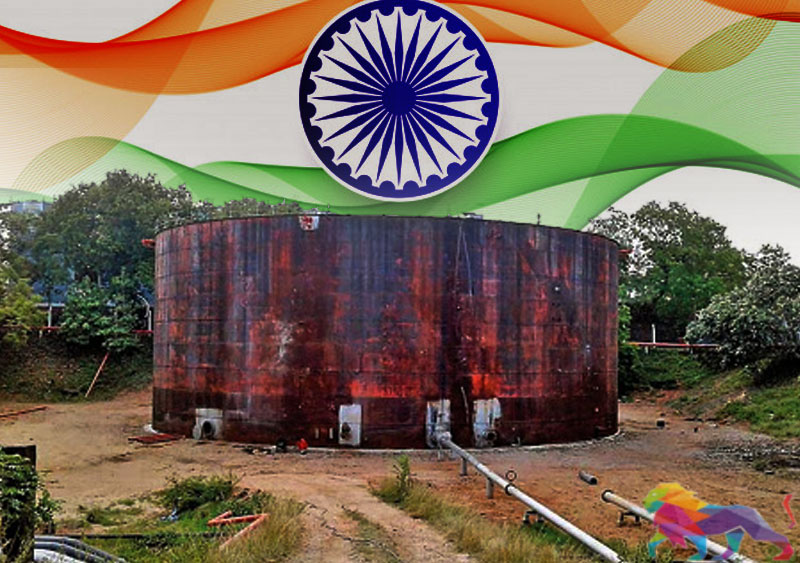Energy Minister Udaya Gammanpila yesterday described the regaining of the broader control of Trinco Oil Tank Farm by the State-owned Ceylon Petroleum Corporation (CPC) as a “historical victory” following the successful conclusion of the renegotiations with India.
He told the media that as per new agreement, 24 of 99 tanks will be directly given to the CPC by the Sri Lankan Government. “By doing so, 24 tanks will be released from the commitment to develop jointly with India. 14 tanks which are presently being used by the Lanka IOC Plc (LIOC) will be leased to it for 50 years. The balance 61 tanks will be managed by Trinco Petroleum Terminal Ltd. on a lease given by the Sri Lankan Government,” Minister Gammanpila said.
The CPC and the LIOC will hold respectively 51% and 49% of shares of this company which will be a CPC subsidiary company. “Not only the CPC holds majority shares but will appoint four members of the seven-member board including the Chairman. This company will be subject to the supervision of the Auditor General. The officers can be summoned before the COPE in Parliament. Parliamentarians can pose oral questions to the Minister in respect of the company as well,” Gammanpila added.
“As a result of this agreement, 85 out of 99 tanks will be under the control of the CPC, 24 directly and 61 through the subsidiary. The LIOC will manage only 14 tanks. Therefore, regaining the control of Trinco Oil Tank Farm by Sri Lanka is a historical victory,” an elated Energy Minister said following the successful conclusion of negotiations with the Indian Government. Ministry Secretary K.D.R. Olga, CPC Chairman Sumith Wijesinghe, Managing Director Buddhika Madiyahewa and Ministry Advisor Lalith Vidanagamage were present with the Minister.
Gammanpila said the final agreement will be tabled at the Cabinet of Ministers meeting on Monday for approval.
The publicly listed LIOC is yet to make a formal disclosure to the Colombo Stock Exchange on the negotiations or the outcome.
The fate and future of 99 tanks had been contentious. India and Sri Lanka agreed to develop and operate the tank farm jointly in July 1987. The agreement was to develop jointly. However, in February 2003, the entire tank farm consisting of 99 tanks was given to India for a period of 35 years. There was an unsuccessful attempt to take a part of the tank farm as a sublease from Lanka IOC through the MoU entered into in 2017.
In December 2016, the Cabinet of Ministers decided to repair 10 tanks of the farm for its storage purposes. Accordingly, five officers of the CPC entered the premises with prior notice on 29 December 2016 to examine the conditions of the tanks. They were detained by the LIOC claiming unlawful entry. India later conveyed its displeasure over the incident through its diplomatic channels.
“This dark period will end soon. I will enter the Tank Farm premises along with the officers who were subject to harassment, in the near future to hoist our national flag there,” Minister Gammanpila said. “Sri Lankans have been receiving only pessimistic news in the recent past. Hence, we will be happy to deliver this joyful message to patriotic people of Sri Lanka,” he added, signalling a major breakthrough.
Investor sentiments over a favourable deal saw LIOC share price had soared in recent weeks. Yesterday it closed the year at Rs. 73.20 as against Rs. 28.10 in end-November reflecting a gain of Rs. 45.10 or 160%. In comparison to September quarter closing price of Rs. 20.60, yesterday›s level was higher by 255% or Rs. 52.60. In November LIOC›s previous 52-week highest price was Rs. 31.30 and the current highest is Rs. 81.30 achieved last week.
Industry analysts the resolution to the impasse on the 99 tanks will strengthen Sri Lanka’s position to negotiate assistance to source oil from India amidst the severe foreign exchange crisis. Sri Lanka spent $ 385 million on fuel imports in October (up by 72% year on year) and $ 3 billion in the first 10 months of 2021 up by 40% year on year.


